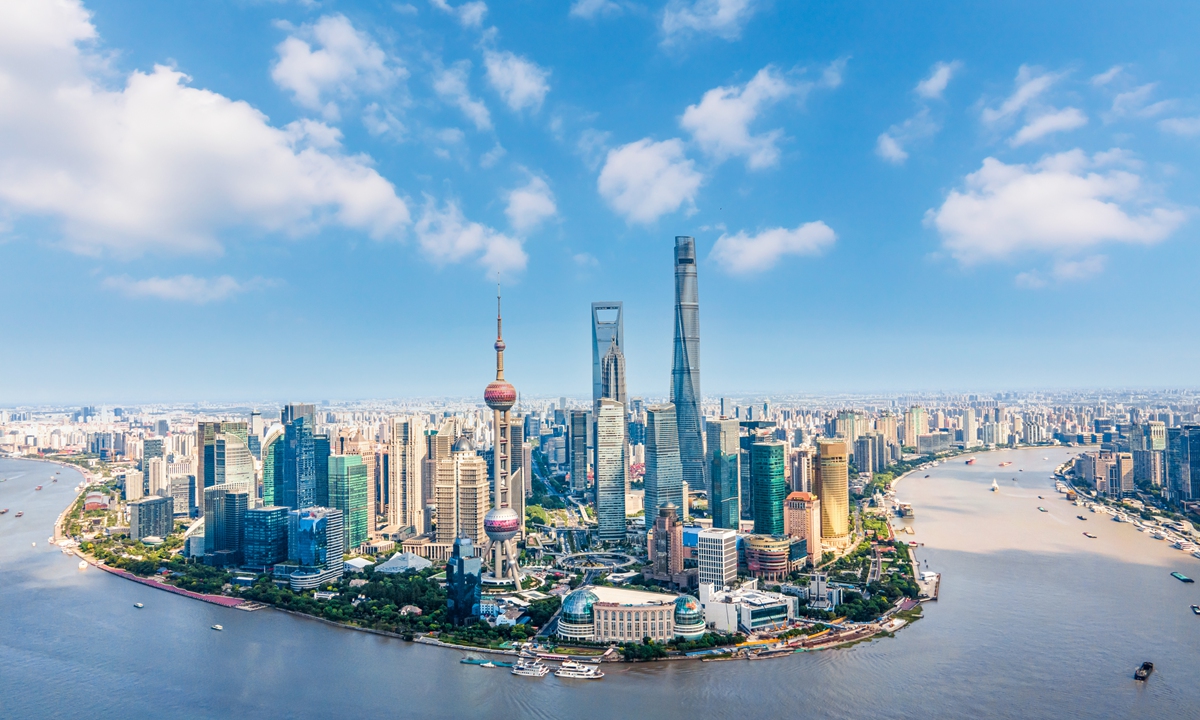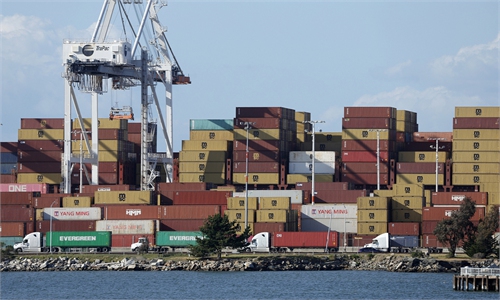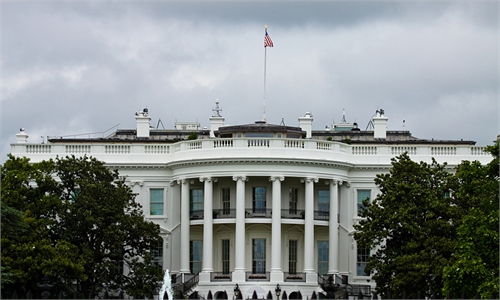
A view of the Lujiazui area in Shanghai Photo: VCG
The US side on Wednesday claimed that it has been disadvantaged in international trade and raised tariffs on all its trading partners under the pretext of "reciprocity," including China, which sent shockwaves across the world. The Chinese Commerce Ministry urged the US to immediately cancel its unilateral tariff measures and properly resolve differences with its trading partners through equal dialogue. Facing the impact of a new wave of unilateralism and protectionism, China will firmly safeguard its legitimate rights and interests with precise countermeasures. At the same time, it will unswervingly promote high-level opening-up to share opportunities and achieve mutual benefit and win-win results. This is not only a rational choice for us to deal with external storms but also a demonstration of our confidence to maintain stability amid unprecedented changes in a century.
No countercurrent of unilateralism and protectionism can stop the trend of opening up and cooperation. The US' current round of tariff measures may seem menacing, but in fact, it will be trapped in a self-inflicted dilemma. US economists have warned that Trump's tariff plan will lead to many consequences, such as a rising cost of living for middle- and low-income people, massive evaporation of wealth for high-income earners due to stock market turmoil, and US companies facing retaliatory tariffs from other countries. Mark Zandi, chief economist at Moody's Analytics, said that if the tariffs stay in place for three to five months, it would be enough to "push the economy into recession." Obviously, practices that violate economic laws are doomed to fail, and the sentiment that "tariffs will make the US isolated" is also very strong in the US. This further demonstrates that opening up and cooperation are what people want and represent the strong call of the entire international community, including American society.
No matter how the situation changes, China has always been a staunch defender of an open world economy. This approach is based on experience. Over the past few decades, China has deeply integrated into the global economy through reform and opening-up, not only achieving leapfrog development itself but also providing the world with a vast market and high-quality products. The 2024 Kearney FDI Confidence Index, published by the American global management consulting firm Kearney, showed that China jumped from 7th position to 3rd. In the ranking for emerging markets, China ranks first. This year, entrepreneurs from Europe, Asia, South America, and the US have actively come to China to discuss cooperation. This is the mainstream voice in the international community seeking cooperative development. Opening-up brings progress, and cooperation leads to win-win results, which has long been repeatedly proven in practice.
China's commitment to high-level opening-up has never been a stopgap response to external pressure; rather, it is a long-term strategy to drive its own progress and promote shared development. That is why China's approach to opening-up will not change course due to external headwinds, nor will it waver in the face of short-term fluctuations. Apart from the recently announced countermeasures against the US, China's overall tariff level remains at 7.3 percent - a relatively low rate by international standards and below the 9.8 percent commitment it made upon joining the WTO. At the same time, China continues to relax market access, enhance the protection of intellectual property rights, and improve its law-based business environment. This allows multinational enterprises not only to benefit from the consumption upgrade of over 1.4 billion people but also to participate deeply in the innovation and advancement of China's industrial chains. By actively serving as "a stabilizing force" for global tariff levels and working with the world to "make the pie bigger," China demonstrates the vitality of its open economy.
It is also important to emphasize that China's opening-up has never relied on a single market. Instead, it is rooted in mutually beneficial cooperation and reciprocal engagement with countries around the world. The high-quality implementation of the Regional Comprehensive Economic Partnership (RCEP), steady progress in building the Belt and Road Initiative (BRI) to high standards, and the accelerated development of pilot free trade zones and free trade ports all reflect this commitment. From ASEAN remaining China's largest trading partner for four consecutive years to over 80,000 China-Europe freight train trips in the past decade; from the establishment of Africa's first Luban Workshop in Djibouti to the trade volume between China and the member states of the Shanghai Cooperation Organization surpassing $8 trillion- these facts show that as China advances its high-level opening-up, it is also offering the world greater opportunities through high-quality development. Today, China is more resilient in the face of trade conflicts and has more partners in the international community walking alongside it.
The power of objective circumstances far outweighs individual will. Economic globalization may encounter temporary setbacks, but the tide of openness and cooperation is unstoppable. Looking ahead, China will continue to fulfill its commitment to opening-up through concrete actions, working hand in hand with countries around the world to build a more inclusive and equitable global economic system. This will not be swayed by the disruption of a few countries. We hope the US can recognize the historical trend of economic globalization, abandon the outdated zero-sum mentality, return to the right path of dialogue and cooperation, and work with the international community to contribute to global economic stability and prosperity.



